Bruce Logan (born 1938) is a New Zealand conservative Christian author [1] who has been involved in, and is in opposition to liberal social policies within his country for over two decades.
Bruce Logan (born 1938) is a New Zealand conservative Christian author [1] who has been involved in, and is in opposition to liberal social policies within his country for over two decades.
Logan was Head of English at Orewa College in Auckland, until he moved south to Christchurch in the mid-1990s. He became curriculum director at Middleton Grange School, New Zealand's largest evangelical/Christian (Integrated) school at the time. While employed there, Logan also acted as Director for the New Zealand Education Development Foundation (NZEDF), [2] which attempted to interest centre-right political parties in education concerns such as school choice, school bulk funding, the abolition of outcome-based education strategies and a deregulated post-compulsory tertiary education sector.
In Cutting Edge, Logan often reprinted articles from the Institute for Economic Affairs (United Kingdom), British journalist Melanie Phillips, First Things (United States) edited by Richard John Neuhaus, and other Anglo-American and Australian social conservative publications.
He wrote several books for NZEDF, including A Questionable Conception (1998), which opposed comprehensive sex education; A Level Playing Field? (1996), which advocated school "choice". He also wrote Marriage: Do We Need It? (1998) which explored the critical role marriage plays in civil society.
In 2000, the New Zealand Education Development Foundation metamorphosed into the Maxim Institute. [3] Logan served as its first director and also operated out of Christchurch-based offices, as the Institute had offices in Christchurch and Auckland. Middleton Grange provided premises for their Christchurch offices. Logan also published Evidence, the Institute's "policy journal", which ran for fifteen issues (2001–2005).
After the formation of the institute, Logan wrote Same Sex Marriage? (2000) for Affirm, a Tauranga-based New Zealand Presbyterian organisation opposed to civil unions, and lesbian and gay ordination within its denomination. In 2004 he wrote Waking Up to Marriage which repeated and supplemented earlier conservative social scientific research which encouraged promotion of heterosexual marriage over heterosexual cohabitation, and legal recognition of lesbian/gay civil unions, for the Maxim Institute.
During his time at the institute, Logan campaigned against New Zealand's prostitution law reform, euthanasia, lesbian and gay civil unions in New Zealand and other issues related to feminism, family policy and bioethics.
In October 2005 a Christchurch Press reader noticed that a couple of sentences in the fortnightly column written by Alexis Stuart (Logan's daughter and Maxim supporter) were identical to sentences in an article by Logan published on the Maxim Institute website. It remains unclear as to who copied what from whom. [4]
On 17 October 2005, Paul Litterick of the New Zealand Association of Rationalists and Humanists used Copyscape , a web-based plagiarism detection service, to analyse Logan's published newspaper work. He alleged plagiarism in Logan's work, and published the results in the Fundy Post (Issues 18 and 19), an online chronicle of the alleged excesses of New Zealand conservative Christians and other faith-based elements. Litterick found that some of Logan's work was taken (in most cases with permission) from Anglo-American sources, which include The Heritage Foundation, Institute for American Values and National Fatherhood Institute, Maggie Gallagher (a US social conservative journalist), Melanie Phillips (UK), Conservative Christian Fellowship (UK) and Digby Anderson, Social Affairs Unit (UK).
In November 2005, Logan retired from the Maxim Institute.
In 2006 he published a handful of articles: one article for New Zealand's non-denominational Christian[ citation needed ] newspaper Challenge Weekly, four others for the Otago Daily Times , and two online opinion pieces for former ACT List MP and neoconservative Muriel Newman's New Zealand Centre for Political Debate (now renamed the New Zealand Centre for Political Research). On 24 September 2006, Logan contributed an article to the New Zealand Centre for Political Debate opposing central government administration of welfare state policies. On 14 April 2007, he followed this with another article critical of Sue Bradford's private member's bill to abolish parental corporal punishment of children in New Zealand, which referred to the earlier abolition of corporal punishment in New Zealand schools in 1990.
On 26 October 2006, Logan was a workshop presenter at the conservative Christian organisation Family First's presentation of "Principles of Marriage and the Family" during a symposium entitled the New Zealand Forum on the Family at Butterfly Creek, Auckland. He was not a keynote presenter at the symposium in question. On 22 May 2016, Bruce Logan was cited at the Family First website as a member of Family First New Zealand's Board of Directors [5]
In August of 2012, Logan wrote an article about same-sex marriage and why it threatens civil liberty in the New Zealand Herald. [6] Logan stated "Marriage is neither essentially religious nor a product of tradition. It is not the child of the state." He also states "We are male and female. In the simple and hopeful business of being alive we have children in a union of consenting responsibility, love and thankfulness. It is the fusing of two opposite halves of the human being through which new life may be created.". [6]
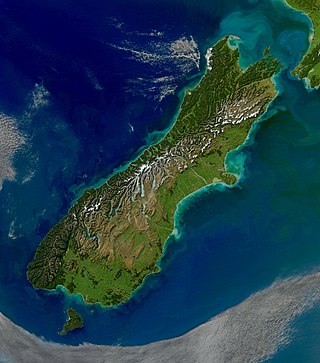
The South Island, also officially named Te Waipounamu, is the larger of the two major islands of New Zealand in surface area, the other being the smaller but more populous North Island. It is bordered to the north by Cook Strait, to the west by the Tasman Sea, and to the south and east by the Pacific Ocean. The South Island covers 150,437 square kilometres (58,084 sq mi), making it the world's 12th-largest island. At low altitude, it has an oceanic climate.
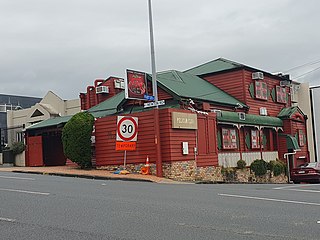
Prostitution in New Zealand, brothel-keeping, living off the proceeds of someone else's prostitution, and street solicitation are legal in New Zealand and have been since the Prostitution Reform Act 2003 came into effect. Coercion of sex workers is illegal. The 2003 decriminalisation of brothels, escort agencies and soliciting, and the substitution of a minimal regulatory model, created worldwide interest; New Zealand prostitution laws are now some of the most liberal in the world.
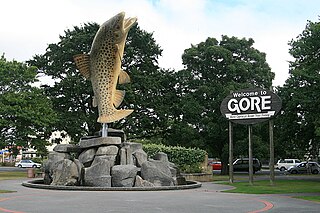
Gore is a town and district in the Southland region of the South Island of New Zealand. It has a resident population of around 8,000 people. Gore is known for its country music scene and hosts an annual country music festival. The town is also surrounded by farmland and is an important centre for agriculture in the region.

The Christian Heritage Party of New Zealand was a New Zealand political party espousing Christian values and conservative views on social policy. Although it never won seats in an election, it came close to doing so in 1996 as part of the Christian Coalition and briefly had a member in Parliament.
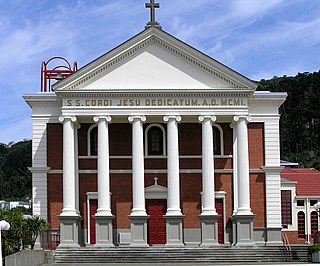
The Catholic Church in Aotearoa New Zealand is part of the worldwide Catholic Church under the leadership of the Pope in Rome, assisted by the Roman Curia, and with the New Zealand bishops.

Dunedin is the second-largest city in the South Island of New Zealand, and the principal city of the Otago region. Its name comes from Dùn Èideann, the Scottish Gaelic name for Edinburgh, the capital of Scotland. The city has a rich Māori, Scottish, and Chinese heritage.

This article discusses Christian politics in New Zealand.

Sir James Allen was a prominent New Zealand politician and diplomat. He held a number of the most important political offices in the country, including Minister of Finance and Minister of Foreign Affairs. He was also New Zealand's Minister of Defence during World War I.
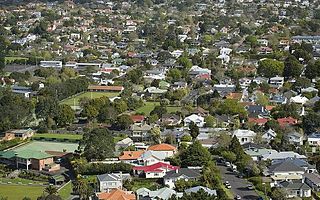
Epsom is a suburb of Auckland, New Zealand. It is located in the centre of the Auckland isthmus between Mount Eden and Greenlane, south of Newmarket, and five km south of Auckland CBD.

The Maxim Institute is a research and public policy think tank based in Auckland, New Zealand. The Institute's work is oriented toward a conservative perspective on its issues of primary concern, which are now education policy, tax and welfare policy. Although initially identifiable as a social conservative organisation, its policy statements have emphasised fiscal restraint within tax and welfare policy since its former director, Bruce Logan, left in 2005.
The Anglican Church in Aotearoa, New Zealand and Polynesia, formerly the Church of the Province of New Zealand, is a province of the Anglican Communion serving New Zealand, Fiji, Tonga, Samoa, and the Cook Islands. Since 1992 the church has consisted of three tikanga or cultural streams: Aotearoa, New Zealand, and Polynesia. The church's constitution says that, among other things, it is required to "maintain the right of every person to choose any particular cultural expression of the faith". As a result, the church's General Synod has agreed upon the development of the three-person primacy based on this three tikanga system. It has three primates (leaders), each representing a tikanga, who share authority.
The Presbyterian Church of Aotearoa New Zealand (PCANZ) is a major Christian denomination in New Zealand. A part of the Reformed tradition, it is the largest Presbyterian denomination in New Zealand, and known for its relatively progressive stance on doctrine and social issues in comparison with smaller Presbyterian churches in the country. Presbyterianism was introduced to New Zealand by early 19th century settlers, particularly from Scotland and Ireland. It was historically most prevalent in the Otago region. The PCANZ was formed in 1901 with the amalgamation of southern and northern Presbyterian churches. It claims around 29,000 members.

The Dunedin School of Medicine is the name of the School of Medicine that is based on the Dunedin campus of the University of Otago. All University of Otago medical students who gain entry after the competitive Health Sciences First Year program, or who gain graduate entry, spend their second and third years studying at the Otago Medical School in Dunedin. In their fourth, fifth, and sixth years, students can either study at the Dunedin School of Medicine (Dunedin), the University of Otago, Christchurch, or the University of Otago, Wellington.
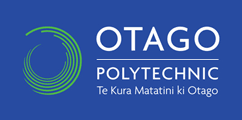
Otago Polytechnic was a public New Zealand tertiary education institute, centred in Dunedin with additional campuses in Cromwell and Auckland. Otago Polytechnic provided career-focused education and training, offering a range of New Zealand accredited postgraduate qualifications, degrees, diplomas and certificates at levels 2–10. In November 2022, it was formally merged into the new national mega polytechnic Te Pūkenga, ending its existence as an independent entity.

Middleton Grange School in Christchurch, New Zealand, is a state-integrated Christian co-educational Year 1 to 13 school. It's currently New Zealand's largest evangelical Christian school.
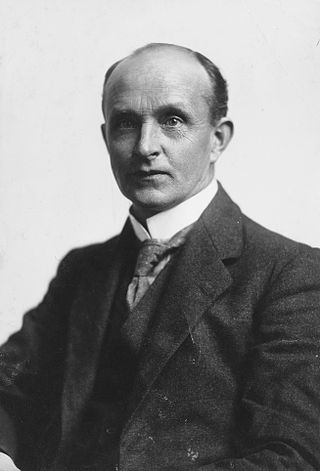
James (Jimmy) McCombs was a New Zealand Member of Parliament for Lyttelton.
Copyscape is an online plagiarism detection service that checks whether similar text content appears elsewhere on the web. It was launched in 2004 by Indigo Stream Technologies, Ltd.
Stuart Hoar is a New Zealand playwright, teacher, novelist, radio dramatist and librettist.
The 1950 King's Birthday Honours in New Zealand, celebrating the official birthday of King George VI, were appointments made by the King on the advice of the New Zealand government to various orders and honours to reward and highlight good works by New Zealanders. They were announced on 8 June 1950.
Di ffrench was a New Zealand photographic and performance artist and sculptor. Her work is in the collection of Museum of New Zealand Te Papa Tongarewa, Auckland Art Gallery Toi o Tāmaki and the Hocken Collections in Dunedin.